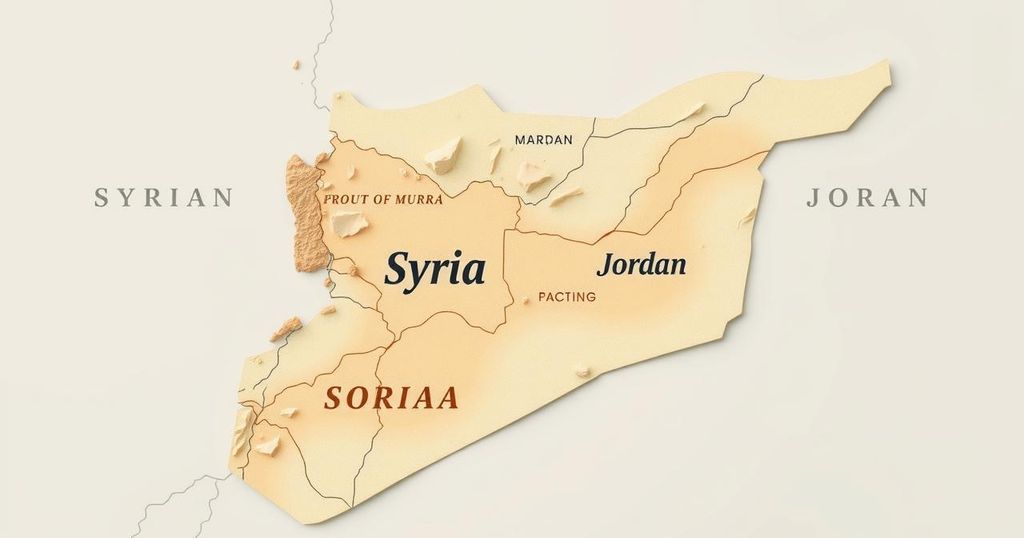The meeting between Syria’s new leader and Jordan’s King Abdullah signifies a pivotal moment in their relationship, emphasizing the importance of Jordan’s support for Syria’s stability and reconstruction. Amid shared border security concerns and economic disruptions caused by the Syrian conflict, renewed cooperation could bolster both nations’ security and economic recovery, while contributing to regional stability.
The recent meeting between Ahmad Al-Sharaa, the new leader of the Syrian Arab Republic, and King Abdullah of Jordan in Amman signifies a crucial development in the bilateral relationship. As Syria enters a phase of transition, Jordan’s support for its recovery and reintegration has gained heightened importance, emphasizing not only assistance in reconstruction but also regional stability and security cooperation.
Jordan has been grappling with the ramifications of the Syrian conflict for over a decade, which has significantly impacted both nations. Sharing a lengthy border of 375 kilometers, Jordan has faced numerous challenges, including an influx of refugees, security threats, and trade disruptions due to the ongoing turmoil in Syria.
This recent dialogue reflects King Abdullah’s renewed commitment to engage with Syrian leadership, reinforcing the necessity for Syria to regain its sovereignty and stability. By endorsing Syria’s reintegration into the Arab world, Jordan is aligning its strategy to foster regional stability and prevent the country from becoming a haven for extremist activities or organized crime.
Reestablishing strong ties between Syria and Jordan is crucial for addressing mutual challenges shaped by their geographical and economic interdependence. Collaboration between the two countries is essential for confronting pressing issues effectively and is pivotal for achieving long-term stability in the region.
Border security remains a significant concern for both nations, particularly with the rise of arms smuggling, drug trafficking, and the movement of extremist groups along the Syrian-Jordanian border. The surge in captagon trafficking, a potent drug, highlights the urgency for stronger border enforcement, leading Jordan and Syria to commit to enhanced border security measures.
In addition to narcotics, both countries face threats from extremist groups potentially taking advantage of the instability in Syria. Jordan’s ongoing vigilance against Daesh and similar factions is vital, emphasizing the need for strengthened counterterrorism efforts to preclude the re-establishment of militant networks.
The conflict in Syria has also severely disrupted economic relations between the two nations, resulting in billions of dollars in trade losses. Historically, Jordan has been an essential transit point for Syrian exports. The ongoing reconstruction in Syria offers an opportunity to rekindle economic cooperation, which would benefit both countries significantly through revitalized trade routes.
Potential infrastructure projects may further enhance bilateral cooperation, facilitating Syrian goods’ access to international markets via Jordan’s extensive transport networks. Additionally, reintegrating Syrian labor could help boost sectors such as construction and agriculture in Jordan, promoting economic recovery on both sides.
Moreover, the energy sector presents an avenue for collaboration. Given the extensive damage to Syrian energy infrastructure during the conflict, Jordan’s developed energy sector could supply much-needed electricity and gas, thus positively impacting Syria’s recovery efforts and deepening economic collaboration.
Jordan is also significantly hosting around 1.3 million Syrian refugees, which has placed a considerable strain on its economy. As the issue of repatriation is delicate, it is essential for both nations to coordinate efforts to create favorable conditions for refugees’ return, such as providing housing and employment opportunities while ensuring adequate legal protections.
The strengthening of Syrian-Jordanian ties yields broader implications for regional stability amid shifting alliances in the Middle East. Jordan’s relations with Syria may cultivate Damascus’ further reintegration into the Arab diplomatic community and enhance constructive interactions with neighboring states.
A stable Syria holds profound significance for Jordan’s long-term security and economic stability. Conversely, Jordan’s support paves the way for Syria to reconnect with the international community and bolster its recovering economy. The cooperation benefits are mutually advantageous, reinforcing the rationale for sustained engagement between the two nations.
As Syria seeks to stabilize and reclaim its regional position, Jordan’s continued support will be indispensable. Through joint efforts on key issues, both countries can forward not only their national objectives but also contribute to an overall stable and prosperous Middle East. A sustained commitment to dialogue and action may very well present a model for regional recovery and resilience.
The relationship between Syria and Jordan is central to fostering stability in the region. As Jordan extends its support, it bolsters Syria’s reintegration into the Arab world while addressing multifaceted challenges, including security, economic revitalization, and humanitarian issues. Both nations stand to gain from renewed cooperation, which may serve as a pathway to a more secure and prosperous Middle East. A collaborative approach will be vital in overcoming past adversities and promoting lasting peace.
Original Source: www.arabnews.com




